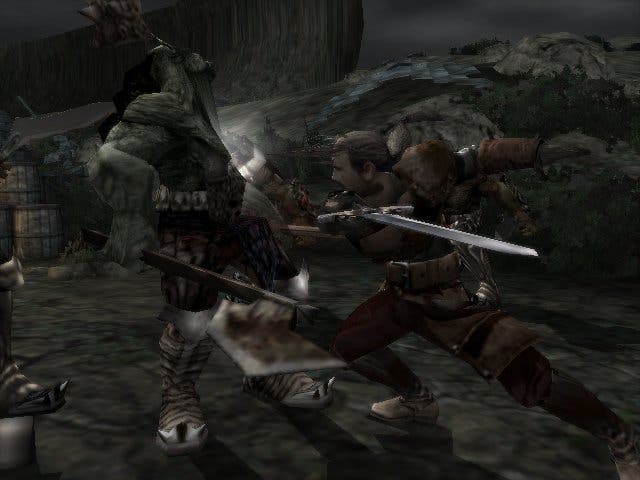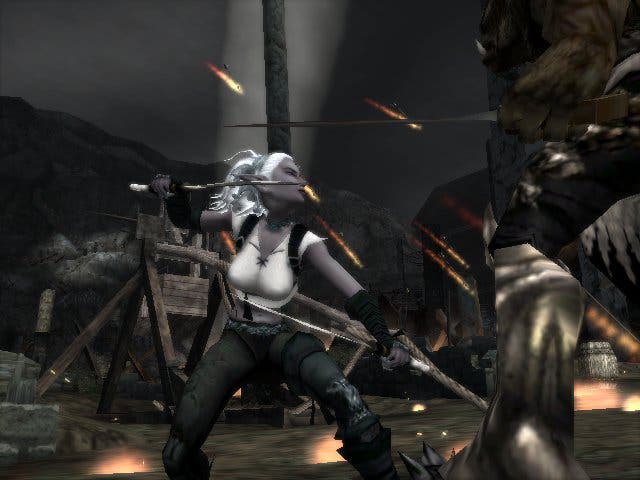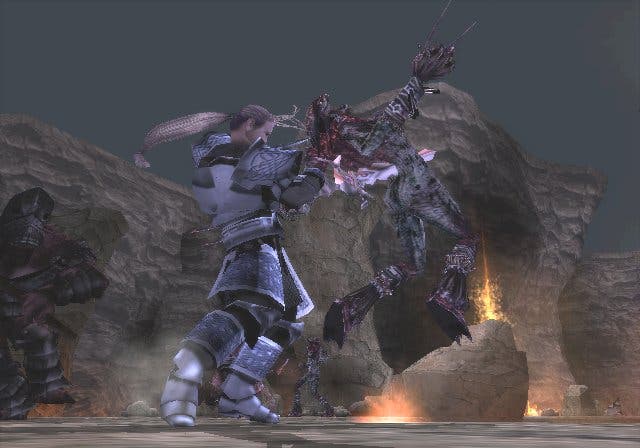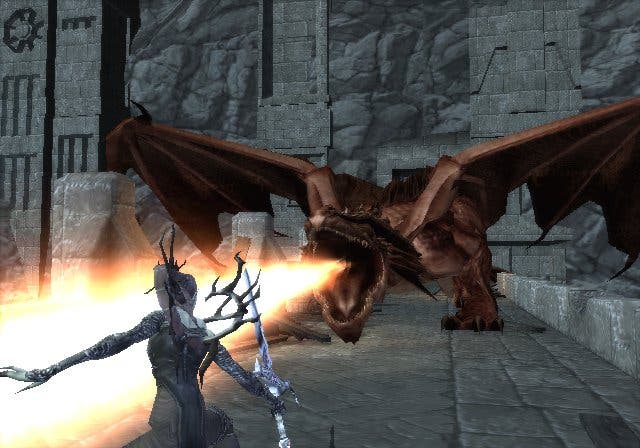Forgotten Realms: Demon Stone
Fear the Deadly Shiny Pebble. Fear it.

Reviews traditionally start with either a joke or an anecdote. Ideally both. Here it is: When typing "Demon Stone" I find myself actually writing "Demon Stoned" by accident in some Freudian hellish dope-head accident.
Onwards!
Developer Stormfront were behind the slick Electronic Arts Two Towers game, which would make this, in an ideal world, the fantasy beat-'em-up Call Of Duty. That is, team parts ways with the 800lb gorilla of videogame publishers and makes a directly competing game to an established franchise, and smashes it in every way imaginable.
Sadly, it's not. Cruel people would note that the clues were there in rather than it being based on one of the cornerstones of 20th century fantasy fiction, it's taken from the derivative Dungeons and Dragons Forgotten Realms world with a story specially created by modern fantasy pulpist RA Salvatore. But only cruel, mean people with few friends and even less manners.
We're cruel people, aren't we? Oh yeah. I'd forgot for a second.
The most obvious - that is, accurate - references are its forerunners. It's a Golden Axe-style fantasy beat-'em-up with particularly impressive backgrounds, high production values and just a smidgen of role-playing elements. Across its ten, lusciously rendered levels you fight a variety of fantasy sorts with a mixture of basic button-bashing and simple combinations that are unlocked through the experience system. The experience system (along with the gold system, which works in a similar way) essentially acts like a bearded man's version of the power-up, allowing you to choose which abilities you gain in which order. In practice, especially towards the end, it becomes increasingly irrelevant as you buy pretty much everything that's available and the latter attacks are improved versions of the earlier ones. Certainly, after the first few levels, your play style won't alter in any significant way. For example, if you're a mage, whether you're firing the basic missile or the top end Meteor storm, it's just a ranged attack with different graphical effects.
The main area where Demon Stone chooses to push the boundaries is in its use of teammates. Imagine if at the beginning of Golden Axe, rather than choosing between Ax Battler, Tyris Flare and the awesomely named Gilius Thunderhead, all three went on an adventure together and you were able to switch between them at [almost -Game Design Ed] any time to utilise their special abilities. And while you took direct control, your other two chums ran around fighting at your side and generally made themselves useful.

The trio hit the fantasy archetypes/clichés relatively directly. There's the warrior, the rogue and the sorcerer. The Warrior is a main melee character, and probably features the simplest skill set - since the actual button combos are shared between all characters, there's not even anything else to learn here. His only defining ability is being able to hit the ground to do considerable damage to blockades and similar.
The half-wood-elf/half-drow rogue is a more acrobatic fighter, with the ability to both jump and hide in the shadows. The former is mainly utilised for locating hidden areas, which leads to the rather odd phenomenon of only getting a "There might be treasure up here?" clue when you've already started the climb. A little like someone telling you "There might be booze in that glass" when you're in the pub. I know! That's why I'm doing it! Most powerfully, once concealed, she's able to dispatch most enemies with a single blow to their back, making her particularly deadly when shadows are available, which despite being set mostly in an array of dank dungeons, isn't always guaranteed.
The sorcerer, as you may have guessed, centres his abilities on the arcane arts. He's the only character to have unlimited [Mystic -Ed] ranged attacks - the Warrior's and Rogue's throwing axes and knives are strictly limited - which upgrade considerably throughout the game. Additionally, he's able to drop [Mystic -Ed] explosives which can be set off with a click of a [Mystic -Ed] button. He's also a few notches on the wizard's staff more capable a close combatant than [Mystic -Ed] tradition would dictate.
Three teammates against a world of dastardly monsters. Does it work? Well, that sounds like as good a time as any to segue into a brief history on computer controlled teammates in videogames. Oh, shush. It's good for you.
Those with long memories and willing to forget the hype will remember that the prime design concept of Daikatana was the fact you were followed by two chums for the entire game, hoping that the interaction between you would add an extra level to the experience. You'd fight side-by-side with your colleagues, protecting each other and growing fond of these computerised brothers in arms. They'd save you. You'd save them. It'll sell millions, I tell you.

Didn't turn out like that. The problem with computer-controlled teammates is that either they're indestructible, in which case there's no need at all for you to look after them, or they're vulnerable. In that situation, either it's the case that not having them alongside you is no big deal or it's absolutely essential (whether at the end of the level because they weren't supposed to die, or midway through when they do die for all the chance you still have of completing it). If the former, then they're just glorified special effects to give a grittily realistic war-aspect to the world, like in Medal of Honour. If it's the latter, then your response to their death is simply frustration that your teammate has gone and got himself killed, normally due to a failing of their AI. Or, at least, that's what you tell yourself. Which may not be fair to the game, but games should play to human psychology rather than expecting us to ignore it.
(It's different with people, of course. Arcade-classic Pang's two-player mode had the brilliantly infuriating aspect where the death of any individual led to an automatic restart of the whole level. Cue lots of invigorating shouting between players when one dies by walking into the last bubble or something similarly stupid. If the computer acted like this, then Pang wouldn't be nearly as fondly remembered. In fact, we'd be cursing its name and arranging assassins to kill the programmers. It's another example of why we're not actually looking for realistic AI in games. Realistic AI would actually be pretty bloody stupid.)
So it's a difficult equation to solve. Very, very few have managed it (Short list: The Chaos Engine. And that's all that comes to mind). The developers who actually get it to work best are those who change the dynamic from co-operative teammate to pure dependent (for perhaps the greatest example, think of Ico).
To its credit, Demon Stone just about pulls it off. Well... just about. In terms of second to second play, they'll act in responsible fighting manners and succeed in not getting themselves killed in embarrassing fashions. Certainly, the vast majority of the times when I died it was my character keeling over rather than my teammates. It also helps that you can switch between the three to choose whose abilities you want to focus on.
That said, the computer is reticent to use the full array of their abilities. The more esoteric skills will be left untouched. For example, if shadow is present, a computer-controlled rogue won't use it in combat. If enemies are only reachable by a ranged weapon, the Sorcerer won't always concentrate on the task. The latter is especially noticeable when there are only enemies separated by a gap and they stand there waiting for you to do the job. There are similar moments in other sections of the game.
It looks great. The central gimmick doesn't completely fall apart, despite some occasionally iffy AI (and what game doesn't have occasionally iffy AI?). There's lots of hitting. There are certainly the components for a good game here, but Stormfront really hasn't provided it.

While the level design, in terms of aesthetics, is universally high, in terms of what it actually asks you to do it regularly fails to impress. In many segments it decides that just locking you in a room and presenting you with waves of enemies is good enough. The boss conflicts drag on endlessly, tediously hitting that sequence to inch down that health bar. Even worse are those where you have to protect a teammate for a period of time, which threatens to become literally endless.
The camera, as predictably as "AI not perfect", has moments of iffyness (though only one section where it thought I'd like to view a combat from a distance of about 100m, with two people fighting in the foreground and the melee I'm involved with in the background. Get out of the way!). Weird choices, like having an opponent type whose attacks ignore the block move predominate at the end, just about removing one of the important elements of skill in the game. Especially odd, as the more advanced combos are genuinely ineffective against it, reducing the game to cheery old button-bashing. Strangeness like how the fine aspects of the game, like how the scenery interactions to - for example - push a ladder away from the side of a castle are only activated by the third-blow in a three-hit combo.
Frustrating madness like failure resulting in you being sent to the last checkpoint, which universally starts with an extended unskippable cut-scene. Oh - and the plot being a seemingly randomly assorted selection of fantasy tropes. If anyone can explain how the Troll siege actually fits in with the rest of the plot, I'd appreciate it.
But aside from the fact it's only sporadically fun, what most kills Demon Stone is what it doesn't include. Firstly, it doesn't include any form of co-operative play, which is genuinely saddening. While they would have had to compromise on the area viewed to make it work, having three unique characters which only ever use their abilities for the small amount of time when you're controlling them seems a waste.
Secondly, it doesn't include much. While Two Towers (and its EA produced sequel Return of the King) were undoubtedly short games, Demon Stone flows through your fingers like water. Starting play on a Saturday night and I'd finished it by the following evening, without even trying seriously and taking lengthy breaks to go and do something a little more entertaining, like the Darwinia Demo, chatting on the internet and arguing with my girlfriend on the phone.
You can just about forgive a game you enjoy for being short. When it's a game you just endure... well, the urge to staple it to the back of a group of hobbits heading southeastward is increasingly attractive.

